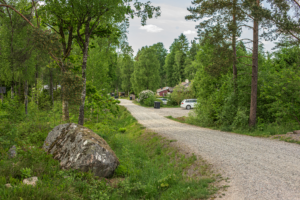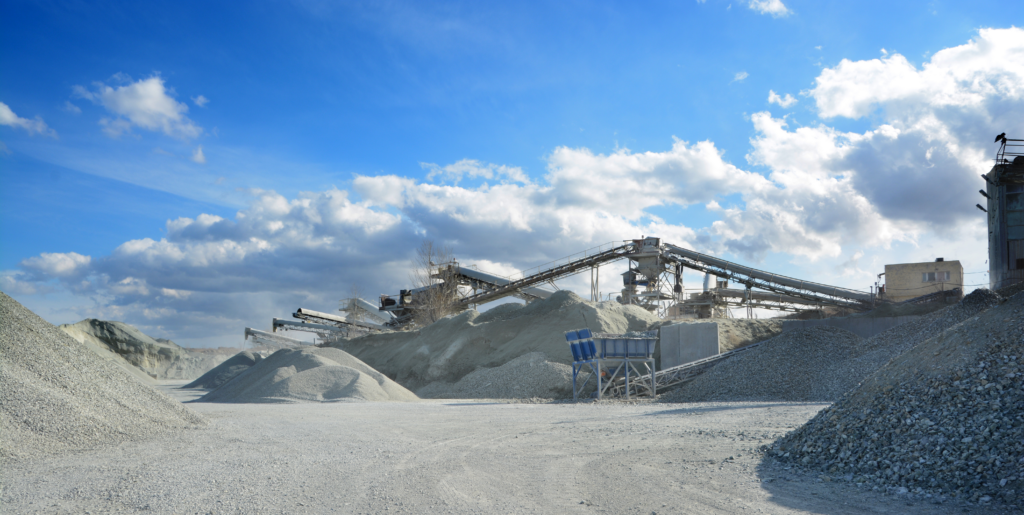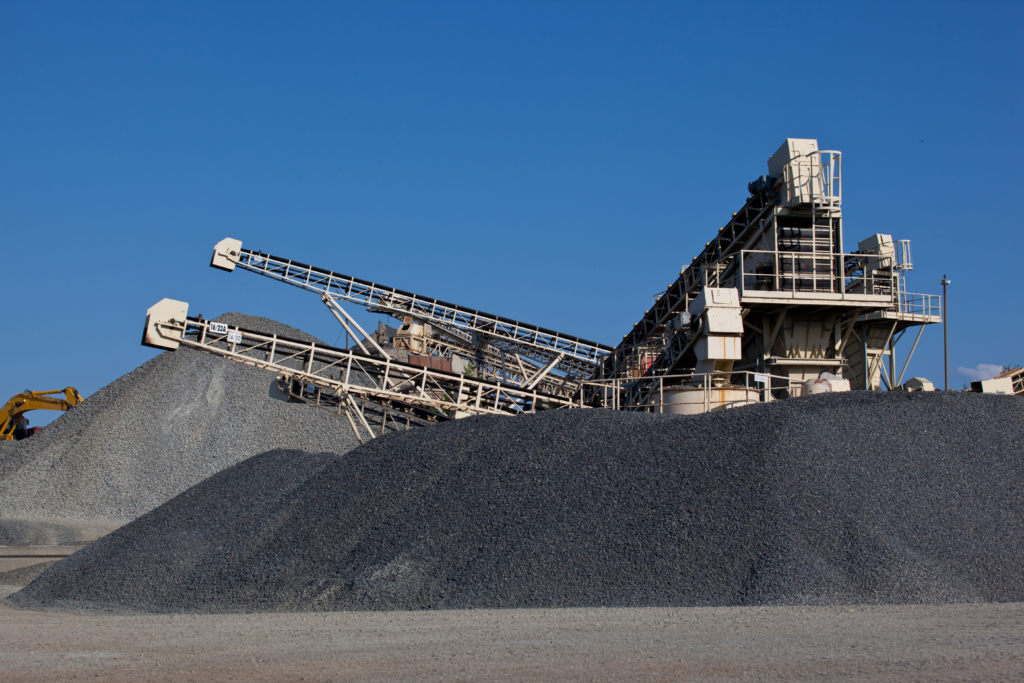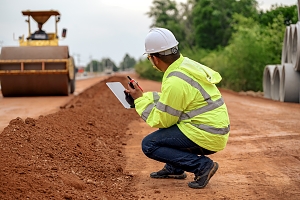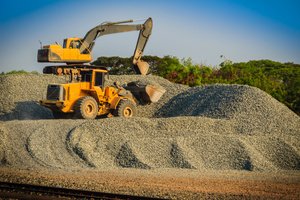The Essential Guide to Gravel Driveway Materials: Durability and Style highlights the critical role of choosing the right material. Gravel is vital for its excellent drainage and stability, key in driveway grading. As you plan, consider the local climate, material availability, and desired aesthetic. Additionally, getting to know various types of gravel can guide your selection. Ultimately, this careful planning ensures a robust driveway that also boosts your property’s curb appeal, creating a lasting impact.
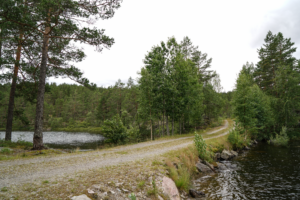 Setting the Stage
Setting the Stage
When it comes to the driveway grading you want to source local materials from the local quarry. This material is mined and usually crushed to standardized aggregate materials.
The standard material sizes for the USA are:
- Crushed Stone: Available in various sizes such as 3/8″, 1/2″, 3/4″, and 1-1/2″.
- Gravel: Common sizes include 3/8″, 3/4″, and 1-1/2″.
- Sand: Often categorized by fine, medium, and coarse grades.
- Rock: Ranges from small pea gravel to larger sizes like 3″ to 5″.
- Recycled Aggregates: Recycled materials such as crushed concrete and asphalt used as environmentally-friendly alternatives in construction projects.
- Rip Rap: Large, angular stones used for erosion control, shoreline stabilization, and drainage projects.
- Railroad Ballast: Crushed stone or gravel used as a base for railroad tracks to provide stability and drainage.
When grading a driveway you need to be mindful of the following key factors:
- Drainage: Ensure proper drainage to prevent water accumulation and erosion. Grade the driveway to slope away from structures and towards drainage points.
- Surface Smoothness: Grade the driveway to create a smooth surface that allows for safe and comfortable vehicle travel.
- Compaction: Compact the graded surface to achieve a stable and durable base that can support vehicle loads without settling or rutting.
- Slope: Determine the appropriate slope for the driveway to facilitate drainage while maintaining safe driving conditions. Generally, a slope of 2-5% is recommended.
- Subgrade Preparation: Prepare the subgrade by removing any organic materials, soft spots, or debris. Compact the subgrade to create a solid foundation for the driveway.
- Material Selection: Choose the appropriate materials for the driveway surface based on factors such as climate, soil conditions, and budget. Options include gravel, asphalt, concrete, and pavers.
- Accessibility: Consider the accessibility of the driveway, including entrance and exit points, turning radius, and clearance for vehicles.
- Local Regulations: Familiarize yourself with local zoning and building codes, as well as any permit requirements or restrictions related to driveway grading and construction.
- Safety: Prioritize safety by ensuring proper visibility, signage, and lighting for the driveway, especially at entrances and intersections.
- Environmental Impact: Minimize the environmental impact of driveway grading by using sustainable practices, such as minimizing disturbance to natural vegetation and implementing erosion control measures.
Based on your existing site conditions and weather, will usually dictate the type of material you need to apply for your gravel driveway.
Understanding Driveway Grading
When it comes to the grading of your driveway you want to work with the existing elevation benchmarks, such as:
- Existing road surface
- Curb and gutters
- Existing driveway entrances
- Water drainage culverts
What you want to do is work with the existing landscape and man made sturctures to allow water to run off the drvieway surface. When driveway grading is designed and properly installed, you can reduce your overal driveway maintenance.
In our “Essential Guide to Gravel Driveway Materials: Durability & Style,” I emphasize the crucial role of driveway grading. This process involves shaping and leveling the driveway surface to ensure optimal drainage, stability, and functionality. By adjusting the slope and contour, I make sure water flows away from structures and toward drainage points like ditches or storm drains. Effective grading prevents water accumulation, erosion, and damage to the surface. It also guarantees a smooth and even surface for safe and comfortable vehicle travel. Ultimately, proper driveway grading is key to creating a functional and durable driveway that boosts your property’s curb appeal.
Choosing the Right Materials
Overview of common types of gravel used for driveway grading, such as:
Crushed stone is a versatile material commonly used in construction projects, including gravel driveways. It is made by crushing larger rocks or boulders into smaller fragments, ranging in size from fine particles to larger stones. Here are the pros and cons of using crushed stone for gravel driveways:
Pros:
- Durability: Crushed stone is highly durable and can withstand heavy traffic and harsh weather conditions without deteriorating.
- Stability: It provides excellent stability and support, minimizing shifting and settling over time.
- Drainage: Crushed stone allows for effective drainage, preventing water accumulation and reducing the risk of erosion and water damage.
- Variety: Available in various sizes and colors, crushed stone offers flexibility in design and aesthetics, allowing homeowners to customize their driveways to suit their preferences.
- Affordability: Crushed stone is generally more affordable than other driveway materials, making it a cost-effective option for homeowners on a budget.
Cons:
- Maintenance: While durable, crushed stone driveways may require occasional maintenance, such as replenishing gravel or addressing uneven areas to maintain optimal performance.
- Weed Growth: The porous nature of crushed stone can allow weeds to grow through the surface, requiring periodic weed control measures.
- Dust and Debris: Fine particles in crushed stone can create dust and debris, which may require periodic cleaning to maintain the driveway’s appearance.
- Initial Installation: Proper installation of crushed stone driveways is essential to ensure proper compaction and stability, which may require professional expertise or equipment.
- Limited Load Bearing Capacity: While suitable for most vehicles, crushed stone driveways may not be ideal for heavy vehicles or machinery, as they can cause rutting or displacement of the gravel.
Overall, crushed stone is a popular choice for gravel driveways due to its durability, affordability, and versatility. However, homeowners should consider the maintenance requirements and ensure proper installation to maximize the longevity and performance of their driveway.
Pea gravel is another common material used in gravel driveways. It consists of small, rounded stones typically ranging from 1/8 inch to 3/8 inch in size. Here are the pros and cons of using pea gravel for driveways:
Pros:
- Aesthetic Appeal: Pea gravel has a natural and attractive appearance, adding texture and visual interest to the driveway.
- Drainage: Like crushed stone, pea gravel allows for effective drainage, reducing the risk of water accumulation and erosion.
- Comfort: The smooth, rounded surface of pea gravel makes it comfortable to walk on, ideal for driveways used for pedestrian traffic.
- Versatility: Pea gravel can be easily shaped and compacted to create custom designs or patterns, allowing for creative driveway layouts.
- Cost-Effective: Pea gravel is generally more affordable than other decorative gravel options, making it a budget-friendly choice for homeowners.
Cons:
- Stability: Compared to crushed stone, pea gravel may not provide as much stability or support, especially under heavy vehicle traffic. It may shift or displace more easily over time.
- Maintenance: Pea gravel driveways may require more frequent maintenance, such as raking or replenishing gravel to fill in low spots and maintain an even surface.
- Weed Growth: The porous nature of pea gravel can allow weeds to grow through the surface, requiring regular weeding to prevent overgrowth.
- Accessibility: Pea gravel may not be suitable for all driveways, especially those used by vehicles with narrow tires, as the small stones can be easily displaced.
- Limited Load Bearing Capacity: Similar to other types of gravel, pea gravel driveways may not be suitable for heavy vehicles or machinery, as they can cause rutting or displacement of the gravel.
Overall, pea gravel offers a natural, aesthetically pleasing option for gravel driveways, but homeowners should consider factors such as stability, maintenance, and load-bearing capacity when choosing this material for their driveway. Proper installation and maintenance are key to maximizing the longevity and performance of a pea gravel driveway.
Crushed granite is a popular material for gravel driveways due to its durability and natural appearance. Here are the pros and cons:
Pros:
- Durability: Crushed granite is extremely durable and can withstand heavy traffic and harsh weather conditions without deteriorating.
- Stability: It provides excellent stability and support, minimizing shifting and settling over time.
- Aesthetic Appeal: Crushed granite has a natural, rustic appearance that enhances the aesthetic appeal of the driveway, adding character and charm to the landscape.
- Low Maintenance: Compared to some other gravel materials, crushed granite requires minimal maintenance, usually limited to occasional raking or replenishing to maintain an even surface.
- Drainage: Like other gravel materials, crushed granite allows for effective drainage, preventing water accumulation and reducing the risk of erosion and water damage.
Cons:
- Cost: Crushed granite is generally more expensive than other gravel materials, which can be a deterrent for homeowners on a budget.
- Weed Growth: The porous nature of crushed granite can allow weeds to grow through the surface, requiring periodic weed control measures.
- Dust: Crushed granite may produce dust, especially when dry, which can require periodic cleaning to maintain the driveway’s appearance.
- Sharp Edges: Some types of crushed granite may have sharp edges, which can be uncomfortable to walk on and may pose a risk of injury.
- Color Variability: The color of crushed granite can vary depending on the source and composition, which may result in inconsistency in appearance.
Overall, crushed granite is a durable and aesthetically pleasing option for gravel driveways, but homeowners should consider factors such as cost, maintenance, and potential weed growth when choosing this material for their driveway. Proper installation and maintenance are essential to ensure the longevity and performance of a crushed granite driveway.
Washed gravel is a type of gravel that has been cleaned of excess dust, dirt, and debris through a washing process. Here are the pros and cons of using washed gravel for driveways:
Pros:
- Cleanliness: Washed gravel is free of excess dust, dirt, and debris, resulting in a cleaner and more aesthetically pleasing appearance.
- Consistency: The washing process helps to create a more uniform size and shape for the gravel particles, resulting in a smoother and more even surface.
- Drainage: Like other gravel materials, washed gravel allows for effective drainage, preventing water accumulation and reducing the risk of erosion and water damage.
- Versatility: Washed gravel is available in various sizes and colors, offering versatility in design and aesthetics for driveway construction.
- Low Maintenance: Washed gravel driveways typically require minimal maintenance, usually limited to occasional raking or replenishing to maintain an even surface.
Cons:
- Cost: Washed gravel may be more expensive than other types of gravel due to the additional processing involved in the washing process.
- Availability: Washed gravel may not be as readily available as other types of gravel, depending on location and supplier.
- Compaction: While washed gravel provides good drainage, it may not compact as well as some other types of gravel, which can affect stability and longevity.
- Weed Growth: Like other porous materials, washed gravel may allow weeds to grow through the surface, requiring periodic weed control measures.
- Limited Load Bearing Capacity: Washed gravel driveways may not be suitable for heavy vehicles or machinery, as they can cause rutting or displacement of the gravel.
Overall, washed gravel offers a clean and uniform option for gravel driveways, but homeowners should consider factors such as cost, availability, and load-bearing capacity when choosing this material for their driveway. Proper installation and maintenance are essential to ensure the longevity and performance of a washed gravel driveway.
Factors to Consider When Choosing Gravel
- Cost: Often times the cost for an asphlat or concrete driveway can inspire you to install a gravel type of driveway.
- Climate considerations: How different climates affect gravel choice.
- Durability: Evaluating the durability of gravel options based on local conditions and traffic.
- Drainage: Importance of choosing gravel that facilitates proper water drainage to prevent erosion and pooling.
- Aesthetics: Balancing practical considerations with aesthetic preferences.
Selecting the Right Gravel for Your Driveway
When it comes to your gravel driveway, you will want to select a locally sourced material (that keeps costs down). In addition you want a material that is readily available to augment your driveway materials and maintain uniformity of color and appearance. When choosing your gravel type material, be sure your supplier has been around for some time and you expect him to around in the future.
You can garner more information, when you seek out quotes for installation and or driveway maintenance. Once you find a good contractor, do all you can to stick with him.
Essential Guide to Gravel Driveway Materials: Balancing Durability and Style
Our guide aims to offer valuable insights and assistance for your project on gravel driveway materials.
Installation and Maintenance Tips
When installing a new driveway, first remove all organic material to reach a solid base. Once done, compact the area and lay down your geotextile woven fabric (stabilization sheet). This step prevents material sinkage into the soil, ensuring your driveway materials remain stable and durable.
Regarding maintenance, I offer these services to numerous homeowners and HOAs. We typically increase maintenance during the wetter months. Additionally, high traffic areas, including those used by garbage services, USPS, FedEx, UPS, and others, may require more frequent upkeep to keep the driveway in top condition. You also need to keep in mind:
- The speed traveled on the road, can play a big part in overall gravel driveway durability.
- Regular grading the driveway
- Slow down the speed on the driveway
- Clean out culvert pipes for unobstructed water flow
- Unrestricted culvert water flow (annual cleaning out of the leaves)
- Installation of rip rap to the edges of the gravel road to prevent tire ruts outside of the road area.
Making Informed Choices for Your Driveway
As the owner of Dirt Connections, my aim is to provide valuable knowledge to help you make informed choices for your driveway project. In this blog, I highlight the importance of sourcing materials locally from your nearest quarry. This strategy is not only cost-effective but also ensures that materials are readily available when you need them.
I outline the various material sizes available in the USA—from crushed stone to recycled aggregates. These are crucial for meeting the specific requirements of your project. Additionally, I cover essential grading considerations. These include ensuring adequate drainage, maintaining a smooth surface, and complying with local regulations, all crucial for the longevity and functionality of your driveway.
Furthermore, I delve into different types of gravel, such as crushed stone, pea gravel, and crushed granite. I discuss the pros and cons of each to help you choose a material that balances durability, aesthetic appeal, and budget.
Moreover, I emphasize the importance of choosing a reliable supplier to ensure consistent quality and long-term availability of materials. I also offer practical advice on proper installation techniques and effective maintenance routines. For example, using geotextile fabric helps prevent sinking and promotes regular driveway upkeep.
This essential guide to gravel driveway materials durability and style is provided to help you with your gravel driveway project. At Dirt Connections, we not only offer expert advice but also specialize in gravel driveway installation and maintenance services. If you’re considering a new driveway or need maintenance on an existing one, we’re ready to assist. To begin, please fill out the form next to this blog post. Someone from our office will contact you promptly to discuss your needs and provide a detailed estimate. We look forward to enhancing the functionality and appeal of your property with our professional services.
Optimizing Gravel Driveway Maintenance for Longevity
Regular maintenance is essential to ensure your gravel driveway remains durable and visually appealing. Frequent grading and monitoring for water flow issues, such as blocked culvert pipes, can prevent erosion and uneven surfaces. Additionally, choosing locally sourced materials, like 21A crusher run, helps maintain a consistent appearance and quality. By addressing high-traffic areas and slowing down vehicle speeds, you can further extend the lifespan of your driveway. Implementing these strategies ensures your gravel driveway stays functional and enhances your property’s curb appeal.
Quick Comment

When building gravel driveways, I use 21A (crusher run). This material includes 3/4 inch aggregate or smaller, with fines. The fines help bind the aggregate, creating a durable and hard surface. Additionally, some quarries offer 21B, which mixes crusher run with cement. Once laid, this material hardens due to the cement content. Check with your local supplier for availability. Note, this material is typically more expensive.
RC 6 consists of recycled concrete, that has been crushed and screened. Typically RC 6 is 3/4″ aggregate or less with fines. This is commonly used as base material. I can be used for driveways and provides good compaction and stability.
RC 6 may be available in your area. This can provide similar driveway grading results for a reduced cost for the material. The only downside is there can be inconsistensies of material color. This material is manufactured from imported materials from various suppliers, hence the crushed material can have different color qualities. This may occur when you import material at a subsequent date for driveway maintenance.
Essential Guide to Gravel Driveway Materials: Durability & Style, I hope this blog has been helpful.
Summary

Dirt Connections was started with one goal in mind: providing quality residential and commercial construction services to clients on time and on budget. Reach out for more information on how we can support your next project.
For your convenience our estimates are free and by appointment. Call 703-940-9949 for a free estimate today!

